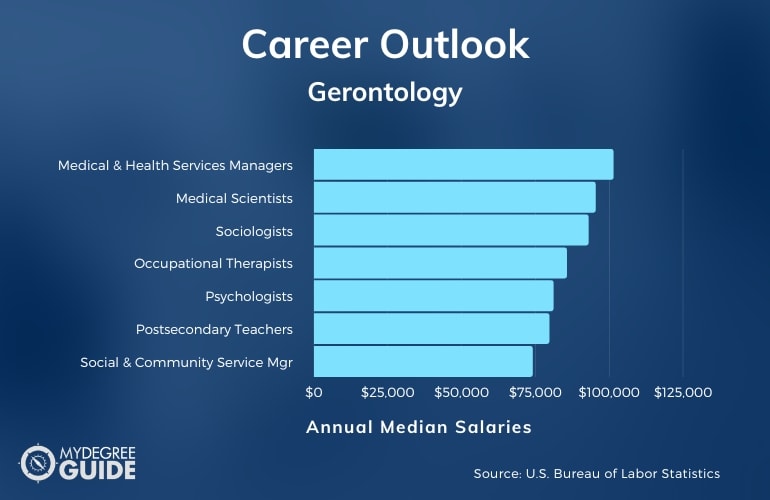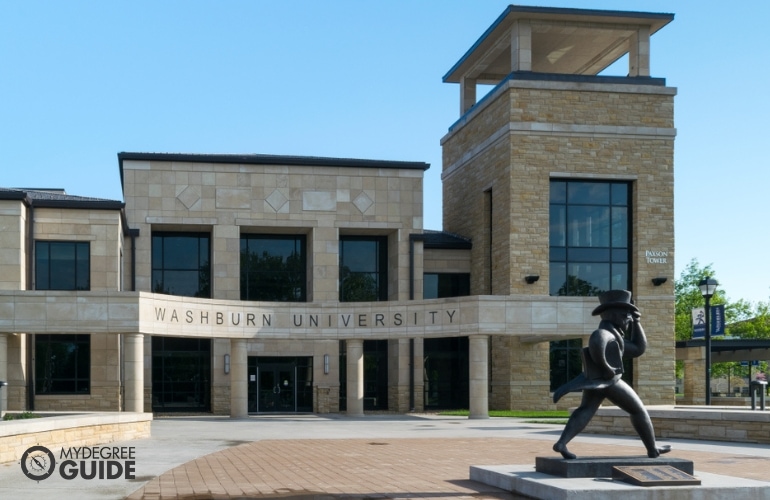A masters in gerontology can serve as preparation for a career related to the wellness of older adults.

Gerontology professionals help improve the quality of life for elderly populations in a variety of areas, including physical health, mental health, and public policy. Jobs in gerontology can be both personally and professionally rewarding, as you may directly contribute to better outcomes for vulnerable people.
Editorial Listing ShortCode:
If you are interested in pursuing this career path, you may be well-served by earning a gerontology master’s degree online.
Universities Offering Online Master of Gerontology Degree Programs
Methodology: The following school list is in alphabetical order. To be included, a college or university must be regionally accredited and offer degree programs online or in a hybrid format.
Arizona State University
Arizona State University’s Master of Science in Aging is available online. The program requires the completion of 12 classes for a total of 36 credit hours. Each class is 7.5 or 15 weeks long. The curriculum consists of courses such as Perspectives on Aging and the Life Course, Research and Program Evaluation Issues in Aging, and Diversity in Aging.
ASU is accredited by the Higher Learning Commission.
Concordia University – Chicago
Concordia University—Chicago offers a Master of Arts in Gerontology program that seeks to prepare students for careers that involve assisting the aging population. The program is available on campus. CU Chicago is a Christian school in the Lutheran tradition that provides a faith-based education and small class sizes.
Concordia University Chicago is accredited by the Higher Learning Commission.
Fort Hays State University
Fort Hays State University offers a Master of Liberal Studies with a concentration in Gerontology. Potential courses include Introduction to Gerontology, Communication in Aging, Neuropsychology, and Exercise Testing and Prescription for Aging. To graduate, students must also complete a culminating experience, which can be a research paper, project, or internship.
FHSU is accredited by the Higher Learning Commission.
McDaniel College
McDaniel College offers an MS in Gerontology that can be earned online or in person. The program requires the completion of 30 to 36 credits, including a capstone or a thesis. Students in the program are given opportunities to present research at national conferences. Prospective students can apply to begin in the fall, spring, or summer.
McDaniel College is accredited by the Commission on Higher Education of the Middle States Association of Colleges and Schools.
Iowa State University
Iowa State University offers a Master of Family and Consumer Sciences with a specialization in Gerontology that can be earned completely online. To graduate, students must complete 36 credits. The curriculum consists of classes like Perspectives in Gerontology, Adult Development, Nutrition and Physical Activity in Aging, and Program Evaluation and Research Methods. A capstone project is also required.
Iowa State University is accredited by the Higher Learning Commission.
Kansas State University
Kansas State University’s online Master of Science in Gerontology program provides scheduling flexibility and a customizable curriculum. Students must complete 30 credit hours of courses to graduate. The curriculum consists of classes like Adult Development and Aging, Advanced Diversity in the Aging Experience, and Advanced Policy and Advocacy in Gerontology. An internship is also required.
Kansas State University is accredited by the Higher Learning Commission.
Texas Tech University
Texas Tech University offers a Master’s in Gerontology that can be earned in a flexible online format. To graduate, students must complete 36 credit hours of coursework. The curriculum consists of classes like Perspectives in Gerontology, Physical Health and Nutrition in Aging, Professional Seminar in Gerontology, and Program Evaluation and Research Methods.
Texas Tech University is accredited by the Southern Association of Colleges and Schools Commission on Colleges.
University of Florida
The University of Florida offers an online program for a Master of Science in Medical Sciences with a concentration in Gerontology. The program features 36 credit hours of coursework and does not require a thesis or any campus visits. Courses are asynchronous, and the degree can potentially be completed in just 1 year.
The University of Florida is accredited by the Southern Association of Colleges and Schools Commission on Colleges.
University of Louisiana – Monroe
The Master of Arts in Gerontology program at the University of Louisiana—Monroe requires the completion of 36 credit hours of coursework. It offers six areas of specialization: Program Administrator, Aging Studies, Long-Term Care Administration, Small Business Management, Mental Health, and Grief Care Management. Graduate assistantships are available.
The University of Louisiana Monroe is accredited by the Southern Association of Colleges and Schools Commission on Colleges.
University of Massachusetts – Boston
The University of Massachusetts—Boston offers an MS in Gerontology that can be earned 100% online. To graduate, students must complete eight required courses, three electives, and a capstone project for a total of 36 credit hours. The program is designed to be flexible and convenient, and prospective students can apply to begin in fall or spring semesters.
UMass Boston is accredited by the New England Commission of Higher Education.
University of Nebraska – Omaha
The University of Nebraska—Omaha offers a Master of Arts in Gerontology program that is designed for working professionals. The degree can be earned online or on campus, and students may choose between thesis or non-thesis options depending on their career goals. Applications are accepted on a rolling basis throughout the year.
UNO is accredited by the Higher Learning Commission.
University of North Carolina – Greensboro
The University of North Carolina—Greensboro offers an MS in Gerontology. Courses are 100% online, and each one is 7 weeks long. The curriculum emphasizes applied learning and collaboration. To graduate, students must complete 30 credit hours of courses such as Social Services for the Aging, Seminar: Critical Issues of Aging, and Research Methods in Gerontology.
The University of North Carolina at Greensboro is accredited by the Southern Association of Colleges and Schools Commission on Colleges.
University of Southern California
The University of Southern California offers a Master of Science in Gerontology that can be earned online or on campus. The program can typically be completed in 2 to 4 years, depending on whether it is being attended full-time or part-time. In addition to coursework, students must also complete a field practicum.
USC is accredited by the Western Association of Schools and Colleges.
University of Utah
The University of Utah has a Gerontology Interdisciplinary Program Master of Science. This online program has both full-time and part-time enrollment options, with full-time students usually finishing in 1 year and part-time students usually finishing in 2 years. Students can choose to complete either a final project or a thesis.
The University of Utah is accredited by the Northwest Commission on Colleges and Universities.
Webster University
Webster University offers a Master of Arts in Gerontology that can be earned exclusively online. The curriculum emphasizes the application of scientific research to solve real-world problems. The program requires the completion of 36 credit hours of courses such as Economic Issues for Older Adults, Physiology of Aging, and Social Science Perspectives in Gerontology.
Webster University is accredited by the Higher Learning Commission.
Masters in Gerontology Online Programs

Gerontology refers to the study of aging. Students in gerontology master’s programs learn about the social, cultural, biological, psychological, and cognitive aspects of the human lifespan. You can also explore how perceptions, policies, and biases affect the lives of older adults.
While completing a graduate degree in gerontology, you’ll receive a multidisciplinary education, which means that you’ll learn about a wide range of subjects. Some of the topics that are typically covered in gerontology programs include:
- Geriatric care management
- Medical physiology
- Geropsychology
- Research skills
- Advocacy
- Disabilities
- Public policy
- Healthcare systems
- Elder abuse and neglect
- Social service programs
- Ethics
- Case management
In addition to knowledge in these disciplines, working with older adults requires a high level of patience, consistency, and concern for the experiences of others.
Many elderly people experience confusion, chronic pain, and depression and need compassion and support. Gerontology professionals also tend to be highly organized and observant so that they can note and report changing symptoms, issues with medications, and signs of mistreatment.
In a gerontology program, you can learn how to hone gerontological skills while earning your masters. Because there is global concern about the wellbeing of elderly populations, a masters degree in gerontology may help you qualify for careers with several different types of employers.
There are many industries that hire gerontology professionals, such as:
- Research facilities
- Retirement communities
- Government agencies
- Community organizations
- Nonprofits
- Private businesses
- Religious organizations
- Universities
- Hospitals
Graduating from an online masters in gerontology program may help you pursue work as a healthcare provider, administrator, geriatric psychologist, sociologist, or gerontologist. Some graduates choose to work as educators who teach others about the implications and effects of the aging process.
Some online gerontology master’s programs offer concentrations for students with specific career goals. Possible areas of specialization include:
- Social work
- Nursing home administration
- Long-term care nursing
- Home care
- Academia
- Physical therapy
- Memory
- Gerontology research
Pursuing a specialization in your degree program may help you prepare for the career that is best suited to your skills and interests.
Gerontology Careers and Salaries

With a rapidly aging population, careers in gerontology are critical to society’s ability to function. After completing a master’s degree in gerontology, you may be well-positioned to take on a role at a long-term care facility, hospital, government agency, or university.
Your exact earnings and job stability are largely dependent on your location and type of positions and employer. For example, social workers who are employed in healthcare facilities tend to earn higher salaries than family social workers.
According to the Bureau of Labor Statistics, many careers in gerontology pay higher than average salaries and are projected to have faster than average growth over the next ten years.
| Careers | Annual Median Salaries |
| Medical and Health Services Managers | $101,340 |
| Medical Scientists | $95,310 |
| Sociologists | $92,910 |
| Occupational Therapists | $85,570 |
| Psychologists | $81,040 |
| Postsecondary Teachers | $79,640 |
| Social and Community Service Managers | $74,000 |
| Healthcare Social Workers | $60,840 |
| Health Education Specialists | $60,600 |
| Community Health Workers | $46,590 |
There’s often a wide range of career opportunities available to graduates of these programs. Some of the potential employment opportunities for gerontology graduates include healthcare, education, community services, and counseling.
As a result, this particular field can be appealing to individuals with different experiences and backgrounds. Some potential students include administrators who hope to manage a long-term care facility or researchers who want to design therapeutic treatments for older adults. Some of these positions may require more specialized education.
For instance, occupational therapists require graduate-level education in occupation therapy. Some gerontology programs may have an OT specialization, or you might search for an occupational therapy program with a gerontology concentration.
Some of the employment areas that will be especially in demand over the next ten years include medical and health services managers (28% job growth) and medical scientists (17%) (Bureau of Labor Statistics).
Gerontology Master’s Curriculum & Courses

An online gerontology masters degree program explores issues related to aging, but the specific curriculum differs depending on your specialization. These are some of the courses that are commonly required for gerontology students:
- Perspectives in Gerontology: In this course, you’ll receive an overview of gerontology topics with influences from a variety of specialized areas.
- Adult Development and Aging: Students in this class learn about the aging process and ethical ways to use interventions when necessary.
- Aging, Values, Attitudes, and Ethics: This class focuses on ethical issues related to older adults, including the way that societies perceive aging and the causes and consequences of ageism.
- Diversity in Aging: This course explores the cultural differences in the perception and experience of aging.
- Sociology of Aging: In this class, you’ll learn how aging affects societies and the ways in which cultures and social groups react to the aging process.
- Public Policies and Aging: This course focuses on relevant policies and the ways in which the policymaking process affects older adults.
- Program Management in Aging: In this course, you’ll learn the leadership skills necessary to manage aging services and organizations that serve older adults.
- Advanced Topics in Gerontology: This class expands on previously discussed concepts and presents a more in-depth examination of the implications of aging.
- Psychology of Aging: Students in this course examine multiple psychological issues related to aging, including social, perceptual, and cognitive perspectives.
- Comparative Studies in Healthcare Delivery: This course focuses on healthcare systems and the ways in which they interact with and engage older adults.
In addition to this coursework, many students in gerontology masters programs also complete practicums to demonstrate the full breadth of their knowledge and skills.
How to Choose a Gerontology Masters Online Program

When selecting a masters program in gerontology, there are many important factors to consider. As you make your decision, it may be helpful to evaluate key points, such as the following:
- Cost. You can compare the cost per credit hour for each program and determine how much financial aid you may be able to receive for each one.
- Format. Some courses in programs leading to online gerontology degrees are offered synchronously, which means that you are required to attend virtual lectures at specific times. Others are asynchronous and leave the scheduling up to your preferences and discretion. Some online programs also require a few in-person sessions over the academic year.
- Support services. Many online programs now offer student services equivalent to traditional campuses. You can look for opportunities like tutoring, accessibility, career guidance, internships, and counseling.
- Accreditation. Programs that are accredited generally have a much higher level of academic quality and may better prepare you for your future career.
- Enrollment status. It can be helpful to determine what options a program offers in terms of full-time and part-time enrollment. Some schools also offer online accelerated nursing programs that can be completed more quickly.
Choosing a college or university to complete your master’s program can be intimidating, but carefully examining each of these points can help simplify your decision.
Admissions Requirements

In order to enroll in an online gerontology master’s program, you’re required to have a relevant bachelor’s degree. Other common admissions criteria include:
- Test scores. While it is becoming less common, some schools require GRE scores.
- Transcripts. You’ll submit official records from your previous academic institutions.
- Letters of recommendation. You can ask previous instructors or supervisors to describe your strengths.
- Statement of interest. You can explain your goals and interest in the field.
- Resume or CV. You’ll include all of your related academic, volunteer, and professional experience.
Schools have very specific admissions requirements, so it’s helpful to pay close attention to the instructions that are provided for each program.
Master’s in Gerontology Programs Accreditation

As you compare schools, it’s important not to overlook accreditation status. To become accredited on a national or regional level, academic institutions must undergo thorough assessments to determine whether they are offering an appropriate level of quality.
Colleges that are regionally accredited are notable because they have met the highest possible standards for academic institutions. Regional accreditation can also make it easier to transfer credits from one school to another.
When researching programs, most accredited colleges and universities include detailed information about their accreditation statuses on their websites. You can also check the US Department of Education’s database of accredited schools.
Financial Aid and Scholarships

As you begin examining potential master’s degree programs, it’s beneficial to also investigate financial aid opportunities. Many students begin by completing the FAFSA to see if they are eligible for federal aid. Some states also have tuition assistance, but it’s beneficial to determine how state aid is handled when applying for online programs.
If you are currently working in the field, another possible avenue for aid is tuition assistance or reimbursement programs from your employer. Some organizations offer these programs as part of a benefits package or as a form of professional development.
You can also research scholarship opportunities. Many are specific to certain schools, while others are designed for a particular field or for students in certain circumstances, such as members of minority or disadvantaged groups.
What Can You Do with a Masters Degree in Gerontology?

There are diverse opportunities available to graduates of online gerontology master’s programs. Many industries—including education, healthcare, and social services—require the skills and knowledge of gerontology professionals.
Some common career paths for people in this field include managers of care facilities, gerontologists, geropsychology professionals, occupational therapists, and social workers. These individuals contribute to the emotional, physical, and psychological health of the elderly.
Some of these careers, such as those in psychology and occupational therapy, require specified training and education along with studies in gerontology. In addition to the above, some graduates of masters programs in gerontology may go on to pursue on-campus or online adult gerontology nurse practitioner degrees and enter this fascinating profession.
How Long Does It Take to Get a Masters in Gerontology Online?

Most master’s in gerontology programs require students to complete between 32 and 36 credit hours. For full-time students, this generally translates to 18 months to 2 years of study before graduation.
There are ways to either accelerate or lengthen the completion period of a gerontology degree. Students who complete summer courses or enroll in a condensed program may be able to graduate in as little as 1 year. Part-time students, as well as those enrolled in programs with internship or thesis requirements, may need longer to complete their degrees.
What’s the Difference Between a Master in Gerontology vs. Geriatrics?
Master’s programs in gerontology and geriatrics are related because they both deal with older adult populations. Your choice between the two largely depends on your interests.
| Master in Gerontology | Master in Geriatrics |
|
|
If you are interested in many different aspects of aging, you might consider pursuing the study of gerontology.
Is a Master’s Degree in Gerontology Worth It?

Yes, a master’s degree in gerontology is worth it for many professionals. If you are passionate about working with and supporting older adults, you might find a career in gerontology to be rewarding. This field is also a strategic option if you are seeking job security. Because the well-being of older populations is a constant necessity, careers in gerontology are expected to have strong job growth.
For example, the Bureau of Labor Statistics’ projected growth rates for medical and health services managers (28%) and social and community service managers (12%) over the next ten years are much faster than average.
Getting Your Master of Gerontology Degree Online

Caring for older adults is an essential service that requires compassion, empathy, and dedication. If you hope to spend your career bettering the lives of others, gerontology may be a path for you to consider.
Obtaining a masters degree in gerontology is a strategic way to develop the skills and knowledge that are necessary to advance in this field. You can begin by researching accredited colleges and universities with online graduate programs in gerontology.
Whether you are passionate about improving mental health, opportunities, or quality of life for older adults, the advanced study of gerontology may be the next step on your professional journey.
